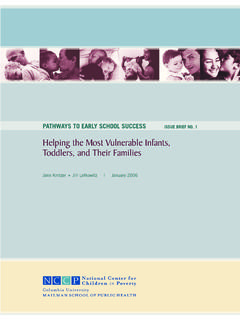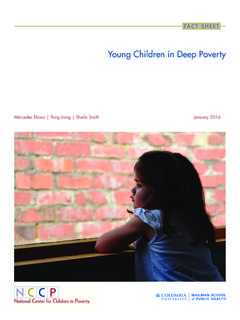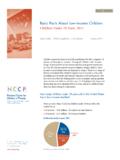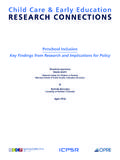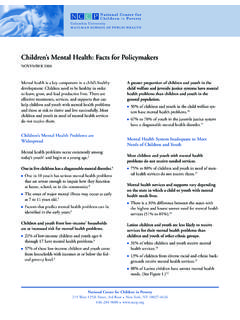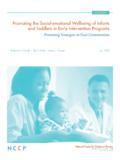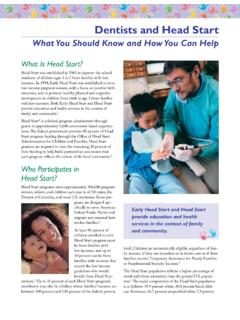Transcription of Building Strong Systems of Support for Young Children’s ...
1 REPORTB uilding < strong >Strongstrong > < strong >Systemsstrong > of < strong >Supportstrong > for < strong >Youngstrong > < strong >childrenstrong > s Mental Health Key Strategies for States and a Planning Tool Sheila Smith | Shannon Stagman | Susan Blank | Christine Ong | Kendra McDow June 2011 < < strong >Strongstrong > >Buildingstrong >Strongstrong > > < strong >Strongstrong > < strong >Systemsstrong > of < strong >Supportstrong > for < strong >Youngstrong > < strong >childrenstrong > S Mental HealtH Key Strategies for States and a planning tool Sheila Smith, Shannon Stagman, Susan Blank, Christine Ong, Kendra McDowAuthOrSSheila Smith, PhD, is director of early childhood at NCCP. Dr. Smith is principal investigator for the evaluation of a New York City LAuNCh Project that is expanding early childhood mental health supports in high needs communities.
2 She directs several projects that track and analyze policies and practices that may affect the early development and learning of low-income < strong >childrenstrong > . With the early childhood team, she led the Center s work to develop the < strong >Youngstrong > Child risk Calculator, an online tool that shows state leaders the number and character-istics of highly vulnerable < strong >Youngstrong > < strong >childrenstrong > in each Stagman is a research analyst on the health and mental health and early childhood teams at NCCP. She currently serves as the evaluation project coordinator for Project LAuNCh NYC, which aims to expand early childhood mental health supports in high need communities in New York Blank, MA, is a consultant whose work includes numerous projects and publications concerned with the quality of child and family services and policies that strengthen supports for < strong >Youngstrong > < strong >childrenstrong > s Ong, PhD, was a visiting researcher at NCCP in 2010-2011.
3 Dr. Ong previously worked as a research ana-lyst at First 5 LA where she participated in the evaluation of early childhood education and health care McDow, MPh, is a fourth year medical student who plans to integrate public health activities focused on low-income < strong >childrenstrong > with a career in authors very much appreciate the < strong >Supportstrong > for this report s preparation and dissemination provided by the Irving harris Foundation, the Mailman Family Foundation, and the Birth to Five Policy Alliance. We are also grateful for the work of NCCP s communication s team: Morris Ardoin, Amy Palmisano, and telly Valdellon.
4 We extend our thanks, as well, to the individuals, cited in the report, who generously provided information about programs and policies in their states. Copyright 2011 by the National Center for < strong >childrenstrong > in Povertythe national Center for < strong >childrenstrong > in poverty (nCCp) is a leading public policy center dedicated to promoting the economic security, health, and well-being of america s low-income families and < strong >childrenstrong > . using research to inform policy and practice, nCCp seeks to advance family-oriented solutions and the strategic use of public resources at the state and national levels to ensure positive outcomes for the next generation.
5 Founded in 1989 as a division of the Mailman School of public Health at Columbia university, nCCp is a nonpartisan, public interest research < strong >Strongstrong > < strong >Systemsstrong > of < strong >Supportstrong > for < strong >Youngstrong > < strong >childrenstrong > s Mental Health 3 < < strong >Strongstrong > >Buildingstrong >Strongstrong > > < strong >Strongstrong > < strong >Systemsstrong > of < strong >Supportstrong > for < strong >Youngstrong > < strong >childrenstrong > s Mental Health Key Strategies for States and a Planning Tool Sheila Smith | Shannon Stagman | Susan Blank | Christine Ong | Kendra McDow June 2011introductionYoung < strong >childrenstrong > s mental health provides an essential foundation for early learning and development. In the early years, < strong >childrenstrong > s mental health can be seen in a wide range of behaviors that promote engage-ment in social relationships and learning.
6 An infant who joyfully participates in conversation with parents is acquiring a capacity for < strong >Strongstrong > social rela-tionships while learning language and the patterns of communication. A toddler shows positive mental health by actively investigating her environment while gaining new cognitive and motor skills during play and exploration. A preschooler who helps his friend build a robot, shares his favorite markers, and rebuilds his block tower after it tumbles is learn-ing social and problem-solving skills that will fuel learning in preschool and beyond. In sum, < strong >Youngstrong > < strong >childrenstrong > s mental health refers to emotional well-being and positive social development from birth through age < strong >Youngstrong > < strong >childrenstrong > with mental health problems miss out on developmental experiences that promote early learning.
7 The behavior problems of some < strong >childrenstrong > result in actual expulsion from early care and education For other < strong >childrenstrong > , men-tal health problems and challenging behavior may limit positive engagement in learning by contribut-ing to conflictual relationships with teachers and < strong >Youngstrong > < strong >childrenstrong > experiencing sadness or anxiety may find it hard to fully participate in growth-promoting play and learning activities. At home, < strong >Youngstrong > < strong >childrenstrong > with problem behaviors may be caught in a cycle of negative interactions with parents that disrupt a nurturing parent-child rela-tionship and further limit < strong >Supportstrong > for the child s healthy What s report describes key strategies for creating a comprehensive system of supports for < strong >Youngstrong > < strong >childrenstrong > s mental health and provides examples from states using these strategies.
8 It also includes a tool that state planners can use to assess progress and plan steps toward < < strong >Strongstrong > >Buildingstrong >Strongstrong > > a < strong >Strongstrong > system of early childhood mental health National Center for < strong >childrenstrong > in PovertyRecent estimates suggest that between nine and 14 percent of < strong >childrenstrong > under age 6 experience emotional and behavioral The prevalence of mental health problems is markedly higher for < strong >childrenstrong > in families facing economic hardship and other stressful circumstances, such as maternal In the absence of interventions, mental health conditions that emerge in the early years tend to persist and interfere with healthy development and State leaders increasingly recognize the critical link between < strong >Youngstrong > < strong >childrenstrong > s mental health and later social adjustment and success in school.
9 In recent years, states have begun to develop new policies and programs that help establish supports for < strong >Youngstrong > < strong >childrenstrong > s mental health across a wide range of set-tings, including pediatric offices and community clinics, early childhood and home-visiting programs, and child welfare These efforts focus on promoting positive mental health, preventing poten-tial mental health problems, and treating identified delays or difficulties in social-emotional development. Many states efforts include the use of evidence-based models and training experiences for service provid-ers to increase their knowledge and skills.
10 Part I of this report describes key strategies that should be part of a comprehensive system of sup-ports for < strong >Youngstrong > < strong >childrenstrong > s mental health and exam-ples from states that are developing and implement-ing them. These strategies are: promoting early childhood mental health (ECMH) in home visiting and parenting programs; enhancing supports for ECMH in early care and education programs; screening parents for depression; screening < strong >childrenstrong > for social-emotional problems; developing a better-trained workforce to address the social-emotional needs of < strong >Youngstrong > < strong >childrenstrong > ; using evidence-based practices and evaluation to promote effective ECMH programs; and supporting the well-being of exceptionally vulner-able < strong >childrenstrong > .
